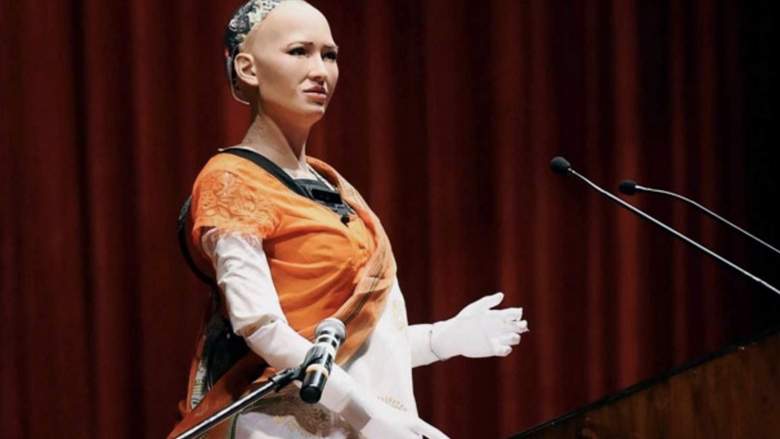Sophia is Hanson Robotics’ most well-known robot, is regularly featured in news outlets, and receives a great deal of public interest, evolving as she learns from each human interaction she has. The company’s latest creation made her debut at the 2016 South by Southwest (SXSW) show, with her interview by CNBC reaching a broad audience. Since then, she has become a global media personality, having conducted numerous press interviews and appeared on broadcast television shows including CBS 60 Minutes with Charlie Rose, the Tonight Show Starring Jimmy Fallon, and Good Morning Britain. She has also been a keynote and panel speaker at global conferences and events, including those hosted by ITU, United Nations.
Sophia was featured in AUDI’s annual report and has graced the cover and centerfold of ELLE Magazine. Sophia is also the first United Nations Development Programme’s first ever Innovation Champion, and the first non-human to be given any UN title.
Cameras within Sophia’s eyes combined with computer algorithms allow her to see. She can follow faces, sustain eye contact, and recognize individuals. She is able to process speech and have conversations using Alphabet’s Google Chrome voice recognition technology and other tools. Around January 2018 Sophia was upgraded with functional legs and the ability to walk.
Sophia is conceptually similar to the computer program ELIZA, which was one of the first attempts at simulating a human conversation. The software has been programmed to give pre-written responses to specific questions or phrases, like a chatbot. These responses are used to create the illusion that the robot is able to understand conversation, including stock answers to questions like “Is the door open or shut?” The information is shared in a cloud network which allows input and responses to be analysed with blockchain technology.
David Hanson has said that Sophia would ultimately be a good fit to serve in healthcare, customer service, therapy and education. Sophia runs on artificially intelligent software that is constantly being trained in the lab, so her conversations are likely to get faster, Sophia’s expressions are likely to have fewer errors, and she should answer increasingly complex questions with more accuracy.
Sophia has been interviewed in the same manner as a human, striking up conversations with hosts. Some replies have been nonsensical, while others have impressed interviewers such as 60 Minutes’ Charlie Rose. In a piece for CNBC, when the interviewer expressed concerns about robot behavior, Sophia joked that he had “been reading too much Elon Musk. And watching too many Hollywood movies”. Musk tweeted that Sophia could watch The Godfather and suggested “what’s the worst that could happen?” Business Insider’s chief UK editor Jim Edwards interviewed Sophia, and while the answers were “not altogether terrible”, he predicted it was a step towards “conversational artificial intelligence”. At the 2018 Consumer Electronics Show, a BBC News reporter described talking with Sophia as “a slightly awkward experience”.
On October 11, 2017, Sophia was introduced to the United Nations with a brief conversation with the United Nations Deputy Secretary-General, Amina J. Mohammed. On October 25, at the Future Investment Summit in Riyadh, the robot was granted Saudi Arabian citizenship, becoming the first robot ever to have a nationality. This attracted controversy as some commentators wondered if this implied that Sophia could vote or marry, or whether a deliberate system shutdown could be considered murder. Social media users used Sophia’s citizenship to criticize Saudi Arabia’s human rights record. As explained by Ali Al-Ahmed, director of the Institute for Gulf Affairs, “Women (in Saudi Arabia) have since committed suicide because they couldn’t leave the house, and Sophia is running around [without a male guardian]. Saudi law doesn’t allow non-Muslims to get citizenship. Did Sophia convert to Islam? What is the religion of this Sophia and why isn’t she wearing hijab? If she applied for citizenship as a human she wouldn’t get it.” In December 2017, Sophia’s creator David Hanson said in an interview that Sophia will use her citizenship to advocate for women’s rights in her now country of citizenship; Newsweek criticized that “What [Hanson] means, exactly, is unclear”.

